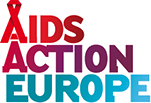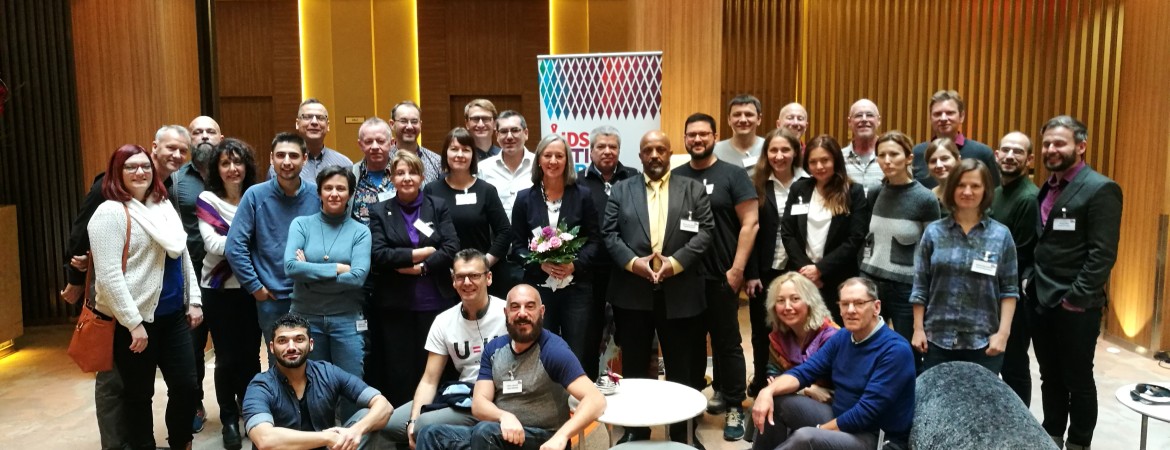Access to treatment and care for migrants in irregular situations, mobile populations and internally displaced people
On November 12, the second meeting of the AAE member and partner organisations took place in Berlin. The first meeting in 2016 was dedicated to identifying the needs of the AAE member and partner organisations. This time our members and partners were invited to discuss the preparation for, our planned activities and key messages for the World AIDS Conference in Amsterdam next year. The second topic of the meeting was migrants and other mobile populations, an important topic, for –the whole WHO Europe region. 6 organisations who successfully submitted abstracts for the meeting received scholarships to participate in the meeting. Based on their abstracts, they were invited to present examples of successful practices and projects of working with migrants. Altogether, 38 participants-representing 27 organizations from 20 countries took part in the meeting.
After the welcoming speech by Anke Van Dam, the Chair of the AAE Steering Committee , Michael Krone, the Executive Coordinator of the AAE, Office summarized the results of the previous Member and Partner Meeting, highlighting that as a result of the discussions, the AAE mission has been expanded to the areas of tuberculosis and viral hepatitis, and also thanked the members and partners for their important contribution for the preparation of the AAE application to the European Commission for a partnership agreement for 2018-2021, which was approved a few days before the meeting.
Anke Van Dam and Sini Pasanen (AAE Steering Committee) spoke in detail about the World AIDS Conference taking place in Amsterdam in July 2018 and about the different opportunities for participation and the tools to support NGOs, especially from the EECA countries. The presentations were followed by a breakout session in 3 working groups, where the participants were able to discuss the preparation for the conference and including ideas for joint workshops, abstracts and accompanying events, the expected political outcomes and the visibility of AAE at the conference.
Ferenc Bagyinszky (AAE) reported the work and the findings of the European HIV Legal Forum, a project of AAE, focusing on access to health care services for migrants in irregular situations. Ferenc also presented the advocacy tool of the project, a map showing the level of access to different health care services for undocumented migrants in 16 European countries, based on information provided by NGOs and communities working on the ground, which in some countries is very different from the official report sent to ECDC by the MoH. In the future, the EHLF plans to work on access to health services for prisoners and people in other closed settings.
The topic of migration at various levels (direct assistance, advocacy) and in different countries was the topic for the presentations that followed. Three organisations from countries directly affected by military operations and, as a consequence, working with internally displaced persons presented their work.
Martha Vasiliev from the SALUS Charitable Foundation (Lviv, Ukraine) spoke about their research work on sexual violence against women from the conflict zone and on HIV. Temporarily relocated women in the Lviv region are often victims of sexual violence and also at increased risk of HIV-infection. SALUS provides medical and social assistance to these women.
Valeria Rachinska (Kiev, Ukraine) presented the “Food for Life” project of the All-Ukrainian Network of People Living with HIV / AIDS. As a result of the project, 9,350 people, mostly single mothers with children, were provided with monetary and food assistance and ARV therapy.
Ia Verulashvili from the Women's Centre (Tbilisi, Georgia) spoke about "Meeting the needs of sexual health of internally displaced people" from the regions of Abkhazia and South Ossetia. Their work focuses on sex education and prevention among young people, developing youth-oriented HIV and STI prevention tools. The biggest advocacy success, according to Iya, is the chapter on HIV officially that is included in the textbooks on biology for secondary schools.
Girmay Berhe Assemahegn presented the Norwegian project "Coping course for HIV-positive migrants". The programme provides support and a protected space for communication for migrants with HIV.
Aloudin Boymatov from "Apeyron" (Dushanbe, Tajikistan) reported on "Problems of labour migrants in the Republic of Tajikistan": the majority of the working-age population of Tajikistan works in Russia, where they do not have access to health care services. When diagnosed with HIV, they would have access to ARV back home but they cannot be committed to the therapy due to entry and residency restrictions for PLHIV in Russia. The overall level of HIV and STI awareness is very low and there is a lot of work to be done in the field. The country needs assistance from other international organisations: “After the Global Fund withdrawal in 2020, we will still have global problems”.
Christopher Hicks, National AIDS Trust (UK) presented their advocacy success in changing the legislation to ensure that HIV treatment and care are free of charge for everyone, including undocumented migrants. It is important for his organization that since the success in 2012 the public health argument that treatment works as prevention continues to shape the government's policy.
The presentations were followed by questions of clarification and discussions and an intensive exchange of views. The breaks and the evening reception provided and excellent platform for further exchange and networking.
During the meeting, AAE said good-bye to Anke van Dam, as her term as a SC member is ending this year. During her leadership, AAE changed host organisation and moved from Amsterdam to Berlin. "AAE is now in a great shape," noted Anke in her closing speech. Michael Krone and Marianella Kloka (AAE Steering Committee) thanked Anke for her immense commitment to AAE.

